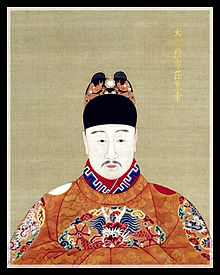Longqing
Longqing隆慶 (March 4, 1537 - July 5, 1572 ), maiden name: Zhu Zaihou朱 載 垕, temple name : Muzong穆宗, was the twelfth Chinese emperor of the Ming dynasty . He ruled China from 1567 to 1572 .
Life
Prince Zhu Zaihou's father, Emperor Jiajing, didn't like his eldest son and would have preferred if his son, who was a month younger than him, had inherited the inheritance. However, due to the elder's right to priority, Zhu Zaihou ascended the throne as Longqing Emperor at the age of 29 in 1567. Excluded from the government by his father, Longqing had no experience in politics. Rather calm and without personal ambitions, he was undecided in decisions, remained silent at court audiences, kept his ministers at a distance and preferred a secluded life in imperial luxury. Nevertheless, he was considered open-minded and liberal.
Under his reign the situation improved, which became more and more evident as the external dangers disappeared. Longqing counted as an enlightened autocrat with a strong focus on social justice and reform. He corrected the mistakes of the Jiajing rule, pardoned his father's unjustly punished officials, and banned the Daoists from court. He also showed talent in filling the highest government offices. First and foremost, Minister Zhang Juzheng proved to be extremely talented. With his advice, Longqing began a liberal reform policy:
The farm expenditure was restricted, the small farmers exploited by the big landowners were taken under protection and the Yellow River and the Huai were regulated . For the maintenance of the river dams, the sincere and efficient administrative officer Pan Jixun (1521–1595) was appointed to the authority for the next 29 years.
In terms of foreign policy, peace was made with the Mongols under Altan Khan in 1570, and in 1573 the Mongols accepted vassal status. Longqing increasingly promoted foreign trade, reopened China to foreign traders and expanded contacts with other countries in Asia and Europe. China's position of maritime power was restored, especially as the Japanese wokou became more and more troublesome on the Chinese coast. The problem could be eliminated by building fortified sea ports in Zhejiang and Fujian and building a new navy .
The Longqing emperor died in 1572 after only five years in office, leaving an eight-year-old boy as heir who took over the throne as Wanli .
literature
- Jacques Gernet: The Chinese World . Suhrkamp paperback. Frankfurt, Suhrkamp 1997. ISBN 3-518-38005-2
- Frederick W. Mote: Imperial China 900–1800. Harvard, Cambridge 2003, ISBN 0-674-44515-5
- Ann Paludan: Chronicle of the Chinese Emperors. Thames & Hudson, London 1998, ISBN 0-500-05090-2
- Denis Twitchett , Frederick W. Mote: The Cambridge History of China. Vol. 7. The Ming Dynasty 1368-1644. Part 1. University Press, Cambridge 1988, ISBN 0-521-24332-7
| predecessor | Office | successor |
|---|---|---|
| Jiajing |
Emperor of China 1567 - 1572 |
Wanli |
| personal data | |
|---|---|
| SURNAME | Longqing |
| ALTERNATIVE NAMES | Zhu Zaihou (maiden name); 朱 載 垕 (maiden name); Muzong (temple name); 穆宗 (temple name) |
| BRIEF DESCRIPTION | Chinese emperor of the Ming Dynasty |
| DATE OF BIRTH | March 4, 1537 |
| DATE OF DEATH | July 5, 1572 |
